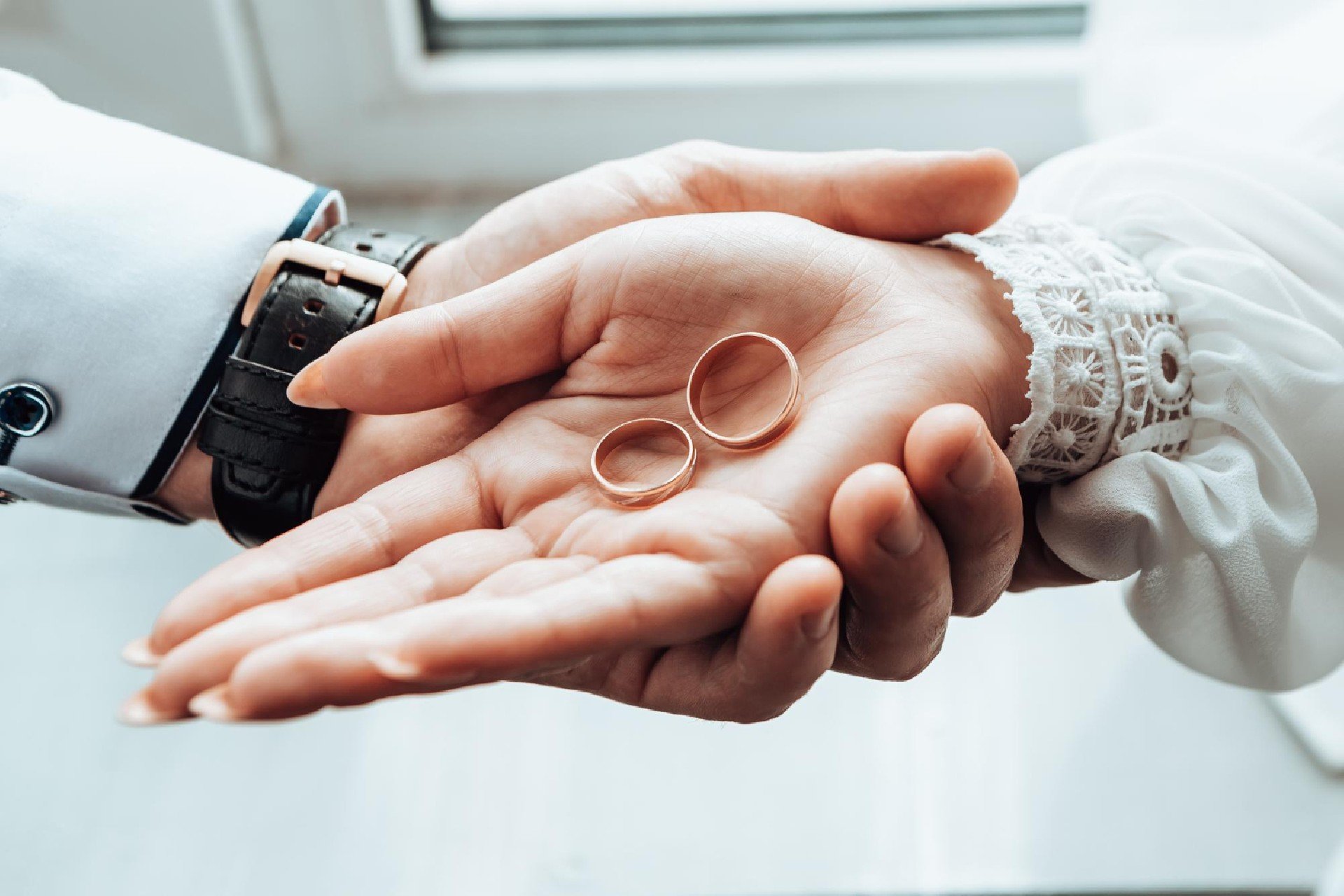Do Muslims wear wedding rings? This question often sparks curiosity, prompting us to delve into the intricate tapestry of Islamic traditions and cultural practices. While the act of wearing a wedding ring might seem universal, its significance within the Muslim world is nuanced, influenced by a blend of religious beliefs, cultural interpretations, and individual choices.
From the symbolic meanings embedded in the ring itself to the diverse customs that shape wedding ceremonies across different Muslim communities, this exploration unveils a fascinating world where faith and tradition intertwine to celebrate the sacred bond of marriage.
Religious Perspectives

The Islamic perspective on wearing wedding rings is a subject that has been debated among scholars and individuals alike. While there is no explicit prohibition in the Quran or Hadith against wearing wedding rings, the practice is not explicitly encouraged either. The interpretation and application of Islamic teachings regarding wedding rings vary, leading to diverse viewpoints within the Muslim community.
Interpretations of Islamic Teachings
Different schools of thought within Islam offer varying interpretations of Islamic teachings regarding wedding rings. Some scholars argue that wearing a wedding ring is a symbolic gesture that can help strengthen the marital bond and serve as a reminder of one’s commitment to their spouse. Others believe that it is not necessary or even discouraged, as it could lead to vanity or excessive adornment, which are considered undesirable in Islam.
- Sunni Perspective: The majority of Sunni scholars believe that wearing a wedding ring is permissible but not obligatory. They argue that it is a matter of personal preference and cultural practice. However, some Sunni scholars discourage wearing expensive or ostentatious rings, emphasizing simplicity and modesty.
- Shia Perspective: Shia scholars generally hold a similar view to Sunni scholars regarding wedding rings. They consider it permissible but not obligatory. Some Shia scholars emphasize the importance of the ring as a symbol of commitment and a reminder of one’s spouse, while others encourage a more minimalistic approach.
Relevant Verses and Hadiths
While there is no specific verse in the Quran explicitly addressing wedding rings, some verses and hadiths are often cited in discussions on this topic. These verses and hadiths generally focus on the importance of modesty, avoiding excessive adornment, and fulfilling marital obligations.
- Quran 33:33: “And stay in your houses and do not display yourselves like [the women] of the former times of ignorance.” This verse emphasizes the importance of modesty and avoiding ostentatious behavior, which some scholars interpret as applying to jewelry, including wedding rings.
- Hadith of Prophet Muhammad: “The best of you are those who are best to their wives.” This hadith emphasizes the importance of treating one’s spouse with kindness and respect. While it does not directly mention wedding rings, some scholars interpret it as implying that any act that strengthens the marital bond is encouraged, including wearing a wedding ring as a symbol of commitment.
Alternatives to Wedding Rings

While wedding rings are a common symbol of marriage globally, Muslim communities have developed various alternative practices and symbols to signify the sacred bond of matrimony. These alternatives often stem from cultural and religious interpretations, reflecting the diverse traditions and beliefs within Islam.
Reasons for Choosing Alternatives
The choice of alternatives to wedding rings is often driven by a combination of cultural, religious, and practical considerations. Some reasons include:
- Religious Interpretations: Some interpretations of Islamic teachings emphasize the importance of modesty and discourage the display of ostentatious jewelry, especially for women.
- Cultural Traditions: Certain Muslim cultures have established practices that differ from the Western tradition of exchanging rings. For instance, in some regions, the act of tying a knot or presenting a scarf signifies the marriage union.
- Practical Concerns: In some cases, individuals may choose alternatives due to practical reasons, such as concerns about the ring being lost or damaged, or the discomfort of wearing jewelry.
Examples of Alternative Symbols and Practices
Here are some examples of alternative symbols and practices used to signify marriage in Muslim communities:
- Tying the Knot: This practice, often referred to as ” katb al-kitab” in Arabic, involves the formal signing of the marriage contract. The act of tying a knot, typically with a white or colored thread, symbolizes the union and serves as a tangible reminder of the commitment.
- Presenting a Scarf: In some cultures, the groom presents the bride with a scarf, often a headscarf or shawl, as a symbol of his commitment and protection. This gesture represents the husband’s responsibility to provide for his wife and safeguard her modesty.
- Wearing a Ring on the Right Hand: While many Muslims wear rings on the right hand as a general practice, some couples choose to wear rings on the right hand specifically as a symbol of their marriage. This is often done to avoid confusion with the left hand, which is traditionally used for prayer.
- Engraving the Marriage Contract: Some couples choose to engrave key verses from the marriage contract or their names on a piece of jewelry, such as a necklace or bracelet. This serves as a constant reminder of their vows and the sacredness of their union.
- Symbolic Gifts: Other couples may choose to exchange symbolic gifts, such as a Quran, prayer beads, or a piece of Islamic calligraphy, to signify their marriage. These gifts hold deep religious significance and serve as a constant reminder of their commitment to their faith and their spouse.
Cultural and Religious Implications, Do muslims wear wedding rings
The use of alternative symbols and practices reflects the diverse cultural and religious interpretations within Islam. These practices often carry deep meaning and significance, reflecting the importance of marriage within Muslim communities. The choice of a particular symbol or practice is often influenced by local customs, family traditions, and personal beliefs.
Wedding Ring Etiquette

While wedding rings are a common symbol of marriage in many cultures, the etiquette surrounding their use within the Muslim community is distinct. Islamic teachings and cultural norms influence how Muslim couples wear and display their wedding rings, emphasizing both religious and social considerations.
Wedding Ring Display and Usage
The act of wearing a wedding ring is not explicitly mandated in Islamic scripture. However, it has become a widely accepted practice within many Muslim communities, symbolizing the commitment and union between a husband and wife. The following guidelines Artikel the general etiquette surrounding wedding ring display and usage:* Modesty and Discretion: Islamic principles emphasize modesty, particularly for women. Some Muslim women may choose to wear their wedding rings on their right hand instead of the left to avoid drawing unnecessary attention.
This practice aligns with the Islamic emphasis on avoiding ostentatious displays of wealth or status.
Visibility and Privacy
While wearing a wedding ring is a public declaration of marital status, some Muslim couples may choose to keep their rings concealed in certain situations, particularly when interacting with individuals of the opposite gender outside of their immediate family. This practice is based on the principle of maintaining boundaries and avoiding inappropriate interactions.
Cultural Variations
Wedding ring etiquette can vary across different Muslim communities. In some cultures, it is customary for both men and women to wear wedding rings, while in others, only the husband may wear a ring.
Religious Considerations
Some Muslim scholars may advise against wearing rings that contain images or symbols that could be considered idolatry. This is based on the Islamic prohibition against worshipping idols or associating partners with God.
Wedding Ring Exchange During the Ceremony
The exchange of wedding rings during a Muslim wedding ceremony is not a mandatory practice. It is considered a modern tradition that has been adopted by many Muslim couples, but it is not rooted in Islamic scripture. The following points highlight the etiquette surrounding the exchange of rings:* Symbolic Act: If a ring exchange is included in the ceremony, it is meant to symbolize the couple’s commitment to each other and their new life together.
Optional Practice
The choice of whether or not to exchange rings is entirely up to the couple and their families. There is no religious obligation to do so.
Blessings and Prayers
During the exchange, the couple may recite blessings or prayers seeking God’s blessings upon their marriage.
Specific Traditions and Customs
Different Muslim communities have developed their own unique traditions and customs surrounding wedding rings. These variations often reflect regional and cultural influences:* Ring Material and Design: The type of metal used for wedding rings can vary. Some couples may prefer gold or silver, while others may choose more traditional materials like wood or bone. The design of the ring can also be influenced by cultural preferences.
Engagement Rings
In some Muslim communities, the exchange of engagement rings is common, while in others, it is not customary.
Wedding Band vs. Engagement Ring
Some couples may choose to wear both a wedding band and an engagement ring, while others may opt for a single ring to symbolize both their engagement and marriage.
Right Hand vs. Left Hand
The choice of wearing a ring on the right or left hand can vary depending on cultural and personal preferences.It’s important to note that wedding ring etiquette within the Muslim community is not a rigid set of rules. It is a combination of Islamic teachings, cultural norms, and personal preferences. Couples should discuss their preferences and make choices that align with their values and beliefs.
As we conclude our journey into the world of wedding rings in Islam, we discover that the practice is not merely a tradition but a reflection of the rich tapestry of faith, culture, and personal beliefs that define the Muslim experience. Whether it’s the symbolic significance of the ring, the diverse regional variations, or the modern adaptations, the act of wearing a wedding ring in Islam speaks volumes about the enduring value of commitment and the celebration of love within the framework of faith.
Answers to Common Questions: Do Muslims Wear Wedding Rings
Is it mandatory for Muslims to wear wedding rings?
No, wearing a wedding ring is not mandatory in Islam. While it’s a common practice, there’s no specific religious requirement. The choice ultimately rests with the individual couple.
What are some common alternative symbols of marriage in Islam?
Some Muslims opt for alternative symbols like bracelets, necklaces, or even a simple declaration of marriage. These choices often reflect cultural preferences or personal beliefs.
What are the Islamic guidelines for wedding ring etiquette?
Islamic etiquette encourages modesty and respect. While there are no strict rules regarding ring display, it’s generally considered appropriate to avoid excessive ostentation.
What are the traditional wedding ring materials used in Muslim cultures?
Gold and silver are common materials for wedding rings in many Muslim cultures. However, the specific choice often varies based on regional traditions and individual preferences.